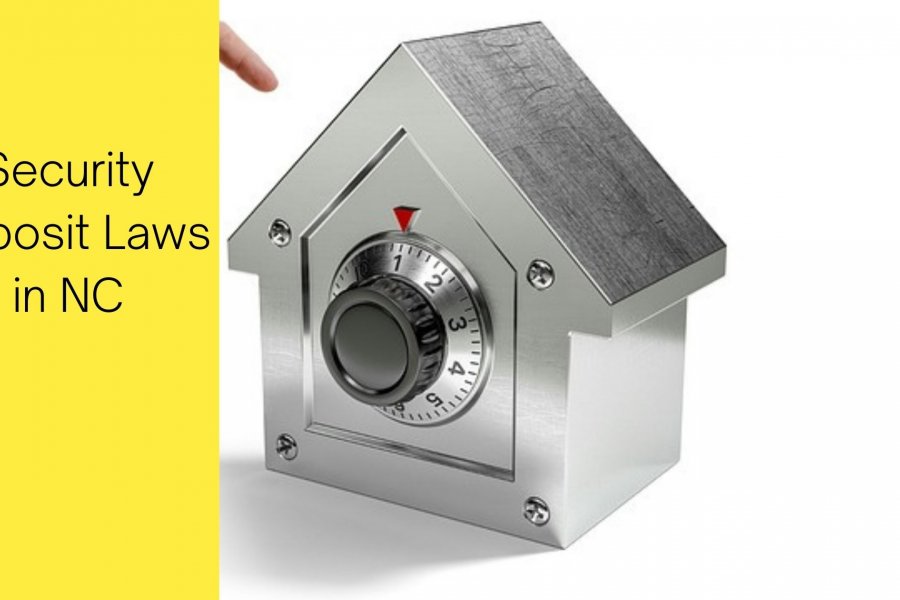
Although not required by North Carolina law, many North Carolina landlords require tenants to pay a tenant's security deposit before moving into their new home.
The purpose of a tenant's security deposit is to provide landlords with a safety net against any losses caused by tenants that an insurance company cannot cover according to North Carolina law. The tenant's security deposit amount charged by a North Carolina landlord can address things such as damages, unpaid rent, and any other obligations outlined in the rental agreement.
It's important that the lease clearly specifies the conditions under which the tenant's security deposit may be withheld, including any deductions for unpaid money or fees, and that the deposit is paid before the rental period begins.
If you're unsure about setting the right amount for the security deposit or need assistance in structuring your lease, consider requesting a free rental pricing analysis from one of our expert property managers.
Our experts can help ensure your security deposit policies align with the local security deposit laws and offer advice on how to handle any potential deductions, including those from a walk through inspection.
Additionally, a free rental pricing analysis can provide valuable insights into optimizing your rental income, managing tenant expectations, and setting proper terms for any deductions from the security deposit.
- Excessive damage to the property: Normally, a tenant must return their rented premises in the exact same way they found it (except for normal wear and tear). Sadly, this does not always take place. A resident may cause excessive property damage, either by accident or through negligence. A landlord will want to protect themselves and their North Carolina rental property by using a tenant's security deposit for this reason.
- Lost rent payments due to the tenant abandoning the unit: Property abandonment is a serious violation of the rental agreement. Under North Carolina law, when a tenant signs a lease, they agree to stay in their rental unit and pay rent for a certain duration of time. If the tenant abadons the unit before the lease ends, the landlord can cut their losses by making appropriate deductions to their security deposit.
- Unpaid rent: Failure to pay monthly rent by a tenant is a serious violation to the lease agreement. Unfortunately, rent payment failure is one of the most common problems that North Carolina landlords experience.
- Unpaid utilities after a tenant move out: A tenant must clear all their utilities once they move out of their rental property. If they don’t, a landlord has the right to make appropriate deductions to their security deposit.
- Excessive cleaning costs after a tenant moves out: Tenants must keep their rental unit in clean and sanitary conditions. If they leave your property in a dire state of uncleanliness, landlords can use part or all of their security deposit to cover the cost needed for a professional cleaner under North Carolina law.
If the landlord fails to abide by the laws, there can be serious consequences.
Because collecting, storing, and keeping track of security deposits and navigating security deposit law can be time-consuming, if you're a North Carolina landlord or real estate investor enlist the help of an experienced property management company. A property manager can handle such tasks on their behalf and avoid potential legal pitfalls, unnecessary small claims court costs, and legal fees.
Guide to North Carolina Security Deposit Law
Is there a limit to how much North Carolina landlords can charge their tenants?
Yes, North Carolina landlords do have a limit on how much they can charge for a renter's security deposit according to the North Carolina security deposit laws. The specific limit for the renter's security deposit in North Carolina is dependent upon the lease term and it has to be reasonable, covering things like unpaid bills, damages, and other lease obligations.
For a weekly lease, security deposits in can be no more than two weeks rent. For monthly leases, the maximum a landlord can charge should be the equivalent of one and a half months rent.
And for leases exceeding one month, North Carolina security deposit limits should be at least the equivalent of two months’ rent. As two months' rent could cover the majority of damages and costs in the rent period.
With that being said, a landlord should be aware that single rooms are exempt from such limits, as well as any other rules on security deposits.
Can landlords require pet deposits in North Carolina?
Yes, North Carolina laws require landlords to charge their tenants a reasonable pet deposit when they move into the landlord's rental properties.

While there are no pet deposits limits set by North Carolina security deposit law, security deposits in must be reasonable. That means it should address only the type of damage that could be caused by a pet.
How should landlords hold their tenants’ security deposits?
Landlords must store their tenants' security deposit in North Carolina in one of two ways. The first is that you can choose to store it in a trust account.
The trust account must be in a licensed and federally insured institution or a trust institution within the state of North Carolina, with an address located within the state.
The second option after a trust account is that North Carolina landlords can store the full deposit in the form of a bond from an insurance company. North Carolina law requires the bond should be in the amount of the security deposit, and the financial institution located in the state.
Once landlords stored the tenant’s deposit in either a form of interim accounting like a trust account or a bond, North Carolina laws state that they must then notify the tenant. Landlords and property owners should do so within 30 days after their lease begins to avoid breaching North Carolina security deposit laws.
What can the landlord use the deposit for?
Carolina security deposit laws general statutes dictate a landlord can only take lawful deductions and reasonable fees from the tenant’s deposit. This happens when either the month to month tenancy lease ends early or has been broken. Also, when the lease has ended, landlords can only use it for specific purposes according to the North Carolina security deposit laws.

For example, allowable deductions from the remaining deposit include:
- A property owner's unpaid bills such as water or sewer services that may be claimed against the unit.
- Excessive damages to the property. This is the destruction or deterioration that occurs as a result of a tenant’s action. A landlord should not confuse this with normal wear and tear, which cannot be covered by the renter's security deposit, as normal wear and tear is a standard part of property ownership, not the renter's cost.
- Costs of storing or removing the tenant’s property after they leave the North Carolina property but before re renting it.
- Damages resulting from the nonfulfillment of the rental agreement, like not paying rent, or if the tenant fails to maintain the unit (again, damage is different from normal wear and tear).
- Damages from breaking the lease early, like the costs of re-renting the unit after a tenant leaves, should they leave before the rental period ends. This includes any unpaid bills.
- Excessive cleaning costs and repair costs, such as carpet cleaning fees or needing to pay to repair broken windows or broken appliances when the tenant leaves.
Can a tenant use the security as last month’s rent?
It isn't common and is not governed by north carolina law, as normally a security deposit serves a different purpose than rent.
However, if both the North Carolina landlord and tenant agree to include such a statement in the lease agreement, a tenant's security deposit can be used as the last month's rent according to the law.
Are tenants in North Carolina entitled to a walk-through inspection?
This occurs when a renter moves out of their rented premises at the end of the lease. Both the landlord and the tenant can walk through the rental to look for and address any damages, normal wear and tear, or illegal alterations to the unit.

In some states, renters have a right to be present during the process. However, the North Carolina landlord tenant laws state the opposite.
When should a landlord return the security deposit back to the tenant?
As per the North Carolina Landlord Tenant laws, you have 30 days to return the security deposit back to the tenant after they move out. If you made any security deposit deductions to the deposit, then you must provide your tenant with an itemized list of the deductions. If a landlord fails to return the deposit then they may leave themselves liable.
The itemized list must be in writing and be sent to the renter's new address alongside the remaining portion of the deposit. The itemized list, or itemized statement, marks what has been damaged and what the cost to repair is, so that both parties have a clear idea of the deductions. Unreasonable deductions may be taken up in court.
In the event you don’t have the forwarding address of the old tenant, you must hold on to the deposit for six months.
If you own multiple properties, it can be tricky to keep track of these deadlines and procedures. You can avoid potential headaches with security deposits by instead choosing to work with a property management company.
What happens if you don’t return the security deposit back to the renter?
In North Carolina, if you don't return a tenant's security deposit, they can sue you for wrongful withholding. What’s more, Landlords may also forfeit any rights to the deposit if they’re found to have willfully failed to comply with any of the rules.
Generally, noncompliance to North Carolina security deposit law can make a landlord liable to both the damages incurred by the tenants, as well as attorney fees or court costs.
What happens if the owner decides to sell the property?
If the landlord transfers property ownership during the lease term, the outgoing landlord will have two options.
One of the options is to transfer the security deposit to the incoming landlord. You’ll then need to let your renters know of the same.
The other option is to return the security deposit amount back to the resident, minus lawful deductions.
Disclaimer: For further help regarding security deposits, trust accounts, or any other legal questions, please consider hiring a professional property management company. The information herein is not a substitute for professional legal advice regarding the North Carolina security deposit laws from a licensed real estate broker or other legal professional.
